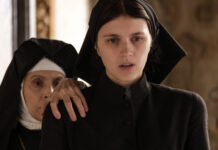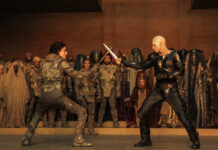This post contains affiliate links and our team will be compensated if you make a purchase after clicking on the links.
I have to admit that I have never seen the original Footloose. After viewing this update to the iconic film that propelled Kevin Bacon into an eternal sphere of dedicated fandom, I felt at no disadvantage having not seen the 1984 version. Remake or not, a film must stand and be judged on its own merits. This re-imagined Footloose does just that, and wisely uses powerful elements from the original while never coming across as imitation art. This film is not just a rehash, but a full-bodied modern tale that stays close to its classic middle-American roots, and perfectly integrates the foot-tapping dancing with heart-stopping drama.
The story takes us to Bomont, a small town buried deep in the American south. A town where good Christian conservatism is the norm and public dancing has been banned. The community’s leader is not a politician, but a pastor, the Reverend Shaw (Dennis Quaid). Teenager Ren MacCormack (Kenny Wormald) arrives in town from the Boston, coming to live with his aunt and uncle on their country dwelling. He is the polar opposite of Bomont — disregarding the status quo, a fiery talker, and a young man with a quiet passion. He soon discovers the hard way that the town takes no liking to loud music or any organized dancing, or young people doing anything unapproved or unsupervised that would qualify as questionable. At Bomont High, Ren he meets Willard (Miles Teller), an unlikely friend, and the two hit it off almost too easily. Willard reveals that Bomont’s prejudice against music and dance is a direct response to a fatal car crash that killed five teenagers one night driving home from a party. Reverend Shaw’s son was one of those who lost their lives in the crash. Ren meets Shaw’s daughter Ariel (Julliane Hough), a gorgeous girl who has chosen to respond to her brother’s death by playing the role of school seductress. Ren avoids her initially, wanting nothing to do with her reckless ways.
Ren as a character represents a dwindling contingent of young adults in the American population. He is a compassionate, well-versed individual who is also driven to accomplish greater things. Actor Kenny Wormald embodies this vision of Ren — confident, suave and yet somehow still very sincere. As Ren absorbs the new culture about him, he realizes he is meant to be the knight in white to save the town and it’s people from their deep-seeded fear, the cause of the tight constraints they have imposed on their younger population. This timeless conflict is the powerful force that makes Footloose so compelling.
Footloose is largely defined by it’s juxtaposition of cultures and convictions. Reverend Shaw is the driving force behind Bomont passing laws to “keep our children safe.” He is quick to misjudged Ren as someone who delights in abusing the community’s rules. Shaw’s displeasure for Ren is only intensified as the boy begins to warm up to Ariel and change her for the better. Dennis Quaid’s work as the Reverend is one of the greatest successes of the film. He delicately balances the character’s genuine Christian roots while being a man who has become embittered at the world and misused his faith as an excuse for his behavior. His eventual emotional dismantling gives way to a broken man, using the pretext of protecting his community to mask the pain of losing his son.
Approaching Footloose, I kept expecting it would fall into the trap of a paint-by-numbers high school drama, or attempt to make the dancing element into an onslaught of music video-inspired sequences. Thankfully, it consistently avoids both. Time after time again throughout the film, writer/director Craig Brewer (Hustle & Flow) toys masterfully with the audience’s expectations. A scene finishes, and one assumes the upcoming events will follow the same trajectory. But Brewer consistently surprises with fresh ideas and strong, emotionally grounded character development. In light of how the concept of Footloose embodies dance, it is refreshing to see an even-handed use of dance sequences used to flavor the film rather than define it. Julianne Hough and Kenny Wormald are dancers first, actors second. But that fact is never apparent in the film, as they handle both roles with equal ability. Dance is perfectly suited as the driving metaphor of Footloose, but any more of it would have cheapened the power of the story.
To my utter delight, this remake surprised me. It goes to prove that once in a while a film comes along that is capable of using the status of their predecessor to their advantage, while reinventing with just enough finesse to bring the timeless message of the power of change to a whole new generation. As the movie proclaims, “This is our time.” Well, I can assuredly say, this is our Footloose.
Discover more from Socalthrills.com
Subscribe to get the latest posts sent to your email.











